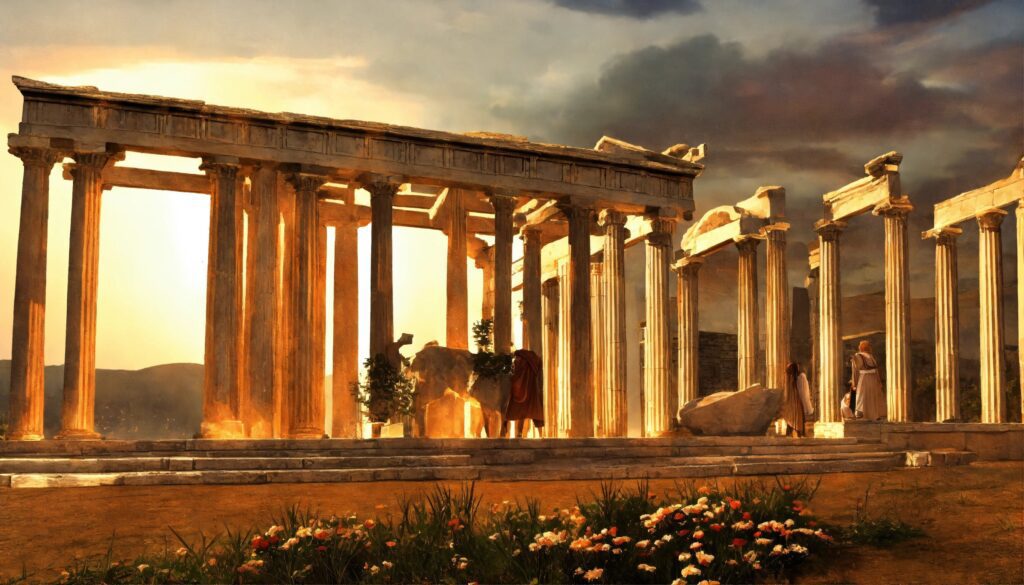Origin of Western Philosophy
Only continuity was realistic in the Greek way of thinking. Cows are born and die, but it was always in the form of cows that remained the same. Behind the turmoil of so many, concrete things were invariable, eternal forms.
So Greek philosophers before Socrates explored what was behind the visible phenomena. So Thales explored water, Anaksimandros explored confrontations, and Democritus explored atoms.
Only continuity was realistic in the Greek way of thinking. Cows are born and die, but it was always in the form of cows that remained the same. Behind the turmoil of so many, concrete things were invariable, eternal forms.
So Greek philosophers before Socrates explored what was behind the visible phenomena. So Thales explored water, Anaksimandros explored confrontations, and Democritus explored atoms.

The natural environment became the source of philosophy.
The surrounding nature and the way they observed it had a very important influence on the formation of the characteristics of ancient Greeks and the determination of their fate.
Geographically, Greece is a place where conflicting natural phenomena are constantly replaced, but there is not much difference between them.
Long mountain ranges cut through the ground, resulting in countless small, closed valleys and plateaus, and countless bays and berths. On beaches in Pediatric Asia and beaches in Greece, where culture will begin, and numerous islands scattered over the Aegean Sea, conflicting elements between the ground and the sea meet under the deep blue sky and permeate each other for many years.
The Greeks enjoy an extremely mild and warm climate, baptized with full light. After traveling to Europe, Herodotus claims Greece has “by far the best climate” among many countries. Irregular beaches and bright light, which are the boundaries between land and sea, are the decisive factors in the formation of the character of the Greeks.
Only continuity was realistic in the Greek way of thinking. Cows are born and die, but it was always in the form of cows that remained the same. Behind the turmoil of so many, concrete things were invariable, eternal forms.
So Greek philosophers before Socrates explored what was behind the visible phenomena. So Thales explored water, Anaksimandros explored confrontations, and Democritus explored atoms.
Beginning of Greek philosophy
The ancient West refers to the 1,200-year history of starting as an urban state centered on the Aegean Sea and the Mediterranean Sea and then forming two huge empires.
This period is divided into two stages again. The first stage is the stage in which the Greeks colonized the east coast of the Aegean and various islands off the coast of Southern Italy to form the first scientific
civilization by accumulating wealth through international trade, but was incorporated into the Great Empire by Alexander the Great.
Of course, this empire is just a third of the way. The second stage was the Roman Empire, covering vast territory in the East, West, North, and South of the Mediterranean Sea. Later, it was divided into East and West, and the ancient world ended when the Western and Eastern Roma were destroyed one after another due to the invasion of the ethnic group.

Step of Greek philosophy
Among them, ancient Greek philosophy began in the first stage, the B.C. 7-century One of Asia and various islands off the coast of Southern Italy, in the Eastern and Western colonies of Greece, blossoming in Athens and then tilting in Rome, finally ending with an “order for the suspension of heretical education” by the Eastern Roman Emperor Justinus in A.D. 529. This 1,200-year history of philosophy is divided into three parts.
The first period is 400 years from the beginning of philosophy to Aristotle’s death. This period is again divided into two periods, and the first period is about 200 years from the beginning of philosophy to before Socrates, and the theme is a period of physics reflection.
The second period is the time when Greek philosophy bloomed in Athens through Socrates, Plato, and Aristotle. The second era is the so-called Hellenistic period, centered around Alexandria for about 200 years, from Aristotle’s death to the completion of the Roman Conquest of the East (B.C. 120).
The third period, the last period of the Roman Empire, is limited to the fall of each other after Egypt, including Alexandria, was annexed to Rome by Octavian (B.C. 30).
Ancient Greece was able to become the birthplace of philosophy and science because of the barren land of Greece. Because they couldn’t farm, the Greeks went to the sea from an early age, engaged in trade, and built villages where they could live.
This was the beginning of the Greek colony, and the merchant was the vanguard of the unknown world. The merchant’s rational thinking became the basis of scientific thinking and the birthplace of scientific thinking.
The man that philosophy talks about
Philosophers Raikov and Johnson say in their book, the following three definitions.
The mind is inherently somatized. Accidents are mostly unconscious. Abstract concepts are mostly metaphorical.
These three guidelines define their philosophy as experimentalism, which can be characterized by a position that is opposed to traditional objectivism. Empiricism like this rejects the objective belief that there is a permanent model or a single objective criterion for all our exploration.
What decisively supports this experiential perspective is the unique explanation of empiricism for the “center of the body” in our overall cognitive activities. So our mental abilities like imagination and meaning and reason are all based on our bodies, which are organisms, and they’re also constrained by our bodies.
The dominant view throughout the history of Western philosophy is that the essence of what makes us human is rationality
The dominant view throughout the history of Western philosophy is that the essence of what makes us human is rationality. Traditionally, reason has been defined as the human ability to think logically, set one’s own goals, and ponder the best means to achieve those goals. Traditionally, reason is understood as a conscious process that works on universal principles.
In addition, there is a distinction between theoretical reason and practical reasons. The theoretical reason is contemplative. It aims to describe and explain phenomena, and is, therefore, a matter of justified belief in beliefs.
Practical Reason, on the other hand, aims to satisfy its needs through action, so it uses the consequences of theoretical reason to determine the best course of action to meet its needs. It is the root of the principles that govern Sudan-goal reasoning and moral behavior.
In this book, the author emphasizes the importance of the mind. “When we are given a new understanding
of the mind, the question of human nature comes up in a very urgent form,” he says. The three propositions that I mentioned earlier are those derived from this premise.
The three propositions are said to be tied together and demand new ways of understanding reason and human nature and also require a new understanding of philosophical questioning, one of the most common and natural natures of human activities.
However, within guaranteeing the autonomy of the philosophical thinking of modern philosophy that denies the absolute axiom, the poetically materialized mind, unconscious thinking, and metaphorical abstract concepts are only one premise.
Likewise, within guaranteeing the autonomy of philosophical reasons, Christian philosophical reasons for human reason, mind, and body can be incorporated into a trend of modern philosophy. In reality, however, the philosophy of starting with Christianity is not welcome. Christian philosopher Herman Doyebert says.
All philosophies that claim to have Christianity as their starting point are challenged by the traditional dogmatism of “autonomy of philosophical thinking,” meaning that they have no religious premise. This dogmatism can be said to be the only thing that has not disappeared even though other uncertainties that conventional philosophy has argued for have generally declined. This decline in conventional certainty is due to the fundamental spiritual roots of Western thought after World War II.
Modern philosophy abandoned metaphysics
Even though modern philosophy says “thought autonomy of philosophy,” it only denies Christian philosophy because it does not allow the premise outside the reason of Christian philosophy. As a result, modern philosophy has become a form of locking itself in the object of philosophy.
Modern philosophy abandons metaphysics … reason and pursues experience only. Even if the philosophy of the body gives us a new understanding of the mind and the problem of the human essence is newly raised in a very urgent form, understanding excluding the Christian premise will not be much different from lack of understanding.
It’s intellectual laziness and arrogance, as Alberts’ paradox shows, where you only see 10 percent of the light, but you don’t see the other 90 percent hidden. The remaining 90% transcendental criticism of the 10% theoretical thinking attitude could be the way forward.
Only transcendental criticism of the theoretical thinking attitude itself can answer this question. This transcendental criticism only enables a theoretical reason and is a fundamentally critical exploration of the universally true conditions required by the internal structure and nature of the theoretical reason itself.
Modern philosophy should listen to Socrates’ admonition for arrogance
Modern philosophy should listen to Socrates’ admonition for arrogance. Because the word “Know yourself” contains a lot of meanings. It shows the limits of humans who are bound to die, narrow-minded thinking regardless of reason or experience, and, above all, the perception of the internal nature of humans who possess divinity.
Socrates’ excellence is that he said that if philosophers before Socrates were interested in physis, then after Socrates they turned to nomos. Here’s what Conford says.
Until then, the philosopher’s gaze was outward to reasonably explain and pursue the changing landscape of the “nature” around us. But now their views are focused on other fields, the order and purpose of human life, especially the nature of the individual soul as a key part of this field. Pre-Socrates philosophy starts with the discovery of ‘nature’ (as I’m trying to explain).
Socrates’ philosophy, on the other hand, begins with the discovery of the human soul.
Greek philosophy, especially Plato’s philosophy
Greek philosophy, especially Plato’s philosophy, was used to facilitate the conversion of Christian ideas into theology for the following reasons.
Platonism had two principles, which were so appealing to early Christians that other philosophical systems were hidden behind them. Unlike Stoa, this is a theory of Eros, a power that expresses the belief in the transcendental world where non-material beings live and the
The human desire for the beauty of “the divine work.”
The successful growth of mid-Platonism assimilated much of Aristotelian philosophy, stoic philosophy, and even skepticism, making the ascetic side of Cynic-Stoic ethics more widely embedded in Platonian metaphysical ethics.
The values of ancient Greek philosophers, even though they did not know God exactly, are those who vaguely met God’s divinity in their deep thoughts.
They were people who reached the knowledge of God only through the reasoning of reason, so today they are equally clear witnesses that humans take the time to see the inexcusable existence of God if they infer deeply using reason.
In Christianity, the reason is often referred to as ‘general revelation’ or ‘general grace’. I’ll tell you about revelation or grace next time, but the use of reason, a general poet, is equally required for believers who meet God through special revelation. Throughout the church’s history, Christianity has been able to create a synergy effect by meeting the other wing of Greek philosophy.
Philosophy, which has led the thought and culture of Hellas, faced new topics that had not been encountered before as it met Christianity. These are the problems of human salvation, free will, and evil, and what has been dealt with in Greek tradition has undergone a fundamental transformation.
Meanwhile, early Christianity also suffered considerable difficulties, such as various forms of heresy in the process of overcoming the attacks of Greek philosophy and explaining its position in philosophical terms and systems. However, through this ordeal, the two ideas set a new turning point in their way.
It is the Greek philosophy that as the Germans made a great migration, ancient times collapsed and even its existence was almost forgotten, but it came under the protection of Christianity, which gained an unrivaled position in Western Europe.
It was essential to embrace Greek philosophy for Christianity, which was born in a Palestinian region, to spread to Greek and Roman culture that spread throughout the Mediterranean.
In the process, Christianity was able to achieve a comprehensive system that religions in other regions had not reached, and the persuasion gained from it became the basis for growing into a universal religion that could later spread around the world.
Cicero brought philosophy to us.
Regarding him, Cicero cites the philosophy that was headed for heaven as a figure who kept us close. This change in philosophy brought about the importance of the soul. The previous spirit, which means life or breathing, is also established as the subject of thought and action.
So he emphasized that human nature is in the soul by saying, “Take care of your soul.” Modern philosophy has to find its way back into ancient wisdom. Socrates’ insight into the subject of reason was outstanding.
Phronesis, Pronema, and Nemesis
The term “Phronesis” refers to the ability will, the ability of the will to practice, which includes the habitual path of the mind or the tendency of emotion. It refers to the action of reason to think about things with joy inside, to think about things, to be obsessed with them, to put all your effort into them, and to think about them with peace of mind.
But the action of human reason is likely to flow toward hubris: Ancient Greek philosophers have discovered a “law of arrogance” that acts on human reason, within the philosophical thought of Onymous. The oracle of Delphi, “Know yourself,” warned of the pride imposed on such a human easily, exhorting humans to have a proper duty, moderation, or self-control.
And when you lose self-control and you lose your self-control and you perform your pride, you have
“Nemesis” — punishment. Nemesis, the goddess of Greek mythology, is the deification of this philosophical thought. As such, Greek mythology contains more philosophical reasons than just myths.
But until Socrates’ philosophy came out, there was a great deal of reason for the “philosophers before Socrates” whose philosophy physis. Enough reason for Physis was to add the depth, width, and width of the reason for Nomes.
As such, theoretical reasons should be helped by transcendental criticism, in which John Calvin concludes that “man looks at God’s face first, and then unless he looks at himself in detail, he will never reach a true knowledge of himself.” It’s because of conceit, which is a natural attribute of all mankind. Therefore, the knowledge of man and God is mutually organic.
All the wisdom we have, true and sound wisdom, is made up of two parts. One is knowledge of God, and the other is knowledge of ourselves. However, since this knowledge is connected in several lines, it is not so easy to find out which one comes first and which one produces the knowledge of the other. A man first turns his mind to “live and maneuver by force” (Haeng 17:28) so that no one can look at him without staring at God.

The Origin of the Western Civilization: the Greek Philosophy and the Bible
Professor Dietrich Schwanitz explains the origin of Western civilization as follows in his book.
The lifeline of Western culture is that one of these two rivers originates from Israel and the other from Greece. These two rivers are two central texts that provide nutritious stories to all the blessing cultures.
He cites two central texts of European culture, one of which is 『The Bible 『, 『Ilias『, which is about the Greek siege of Troy, and 『The Odyssey『, which describes how the resourceful Odysseus gets lost on his return from Troy to his home country where his wife Penelope is.
We covered some of the myths and philosophies of ancient Greece in front of this book. Just as mythology and philosophy cannot be divided, neither scripture nor philosophy can be divided.
The Gospel of John explains Christ in words and introduces and explains Heracetos’ “logos” idea. Logos, by Johan Sado, are both Greek and Hebrew ideas. Before the Act of the Apostles, there is a figure of Paul the Apostle who preached the Gospel to Athens philosophers.
He explained the gospel based on Greek ideas. After the Apostle Paul, Augustine and Aquinas organized Christian theology with the philosophy of Plato and Aristotle. So I mentioned Greek thought earlier.
Greek philosophy helped enrich Christianity
In this way, Greek philosophy helped enrich Christianity by adding LogosLogos, reason, to the Pathos of faith. This is also true of the meaning of the word Theology.
Aurelius Augustine of Hippo, who pursued the “faith in pursuit of understanding,” laid the foundation for medieval Christian theology using Plato’s philosophy and Neo-Platon’s philosophy. Thomas of Aquinas is incomplete with Aristotle’s philosophy, but he wrote a masterpiece called 『Summa Theologica『.
“Belief to understand,” Anselmus wrote 『Monologion『 and 『Proslogion『. In 1998, as announced by Pope John Paul II, said, “Belief and reason are like two wings in which the human mind flies in search of the truth.”
It is a misconception that faith excludes reason. As I’ll tell you next time, faith requires reason, and true faith stimulates the activity of reason. Faith especially today requires philosophy because we need to explain what we believe in our language in the pond to the challenges to Christianity.
So today, we should avoid the intellectual laziness of today’s Christians, who neglect not only philosophy but also Christian doctrines and theology.
It is said that in the early days of Christianity, philosophy and theology were not distinguished like the latter. Therefore, it should be considered that early Christianity had no choice but to meet Christian thought and secular philosophy.
Through such a meeting, I began to distinguish between Christian theology and philosophy, albeit implicitly. It was not until the 12th century that this distinction became concrete. While crossing lines with other Christians, Christians, and Christians trying to answer pagan questions began to discuss topics that encompass both theological and philosophical styles.
But living as a philosopher at the time meant studying so-called metaphysics, devoting oneself to something eternal and immutable, or doing so much magic.
The difference between Christian and Greek philosophy
Human curiosity and imagination about kosmos have given rise to myths, and after opening the eyes of reason, philosophy has been born through reflection. French philosopher Blaise Pascal was a man who was afraid of the vastness of the universe.
But Pascal argued that human reason is greater than anything else because it has the power to identify not only stars but also their identities.
Because reason has the power to understand the reality of the universe and to weigh the importance of its essential meaning. In the history of natural science alone, the human world has changed from the Ptolemaic system, a concentric astronaut around the Earth, to the Copernicus system, a concentric astronaut around the Sun.
Kepler discovered three laws of planetary motion, including the theory that planets centered on the sun orbit elliptically. Newton laid the framework for classical mechanics by publishing the laws of motion and universal gravitation through his three books, 『Principia『, in 1687.
But Newton’s classical mechanics lost their light with the advent of Einstein’s Theory of Relativity. Max Planck said, “Science will never solve the ultimate mystery of nature. If you search with nature, you must explore yourself which is a part of nature.” Plato also said, “All great technologies require keen reflection and high-level exploration of nature.”
But I think Max Plaque is right to say the opening, but I think the ending is wrong. Man explores to solve the ultimate mystery of nature Because it doesn’t end up exploring ourselves, it reminds us of the need to explore the creators who created the world.
『Timios『 is said to have created the universe by Demiourgos, the patriarch, through the materials that existed first. But Christianity believes in creation from nothing and that God created this universe for a purpose.
The difference between the two is that ancient Greek theistic creationism is a stubborn and independent entity that does not “fully obey” the mathematical rules, and the Bible’s theory of creationism proves that matter was not there first but from the hands of God.

Christian Masters’ Assessment of Modern Philosophy
According to John Owen, the law refers to “the rule of order in its original sense and, in its derived sense, the power of law”.
In the primary sense, the law is a moral rule that dictates and commands, which moves and regulates intelligence and will in various ways to request or prohibit the implementation of the law. This is the nature and activity of the law. Laws involving compensation and punishment compel people to do some things, and others by calling them business cards not them.
So in a secondary sense, the law has internal principles that constantly lead or force an action, which is called law, and there is a principle like all things that leads it to move and proceed by its purposes and intentions, which is called natural law.
If scientific thinking is “universal thinking about all the changes related to existence according to the causal law,” then universally valid thinking about the “law” corresponding to the causal law is scientific thinking. The law was an influential tendency, Aristotle called it “Hexis,” and Aquinas called it “Habitus.”
The tendency law works in the mind, and John Owen explains the tendency of the mind. In this Bible text, the Greek word “Pronema,” which means “thinking,” is translated in a wide variety of ways. The term ‘Pronesys’ refers to mind-led capabilities and actions. It refers to the light, wisdom, prudence, knowledge, intelligence, and discernment of the mind.






